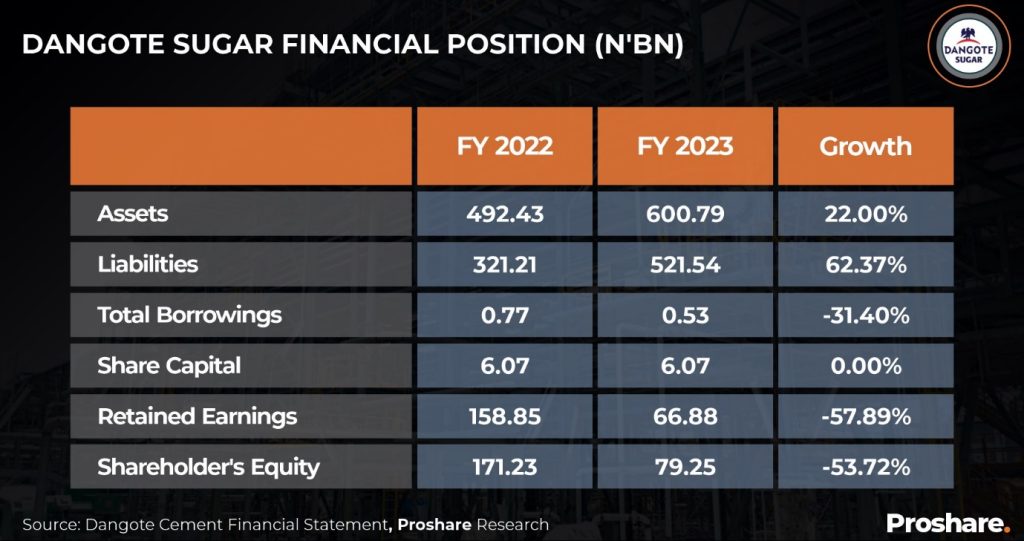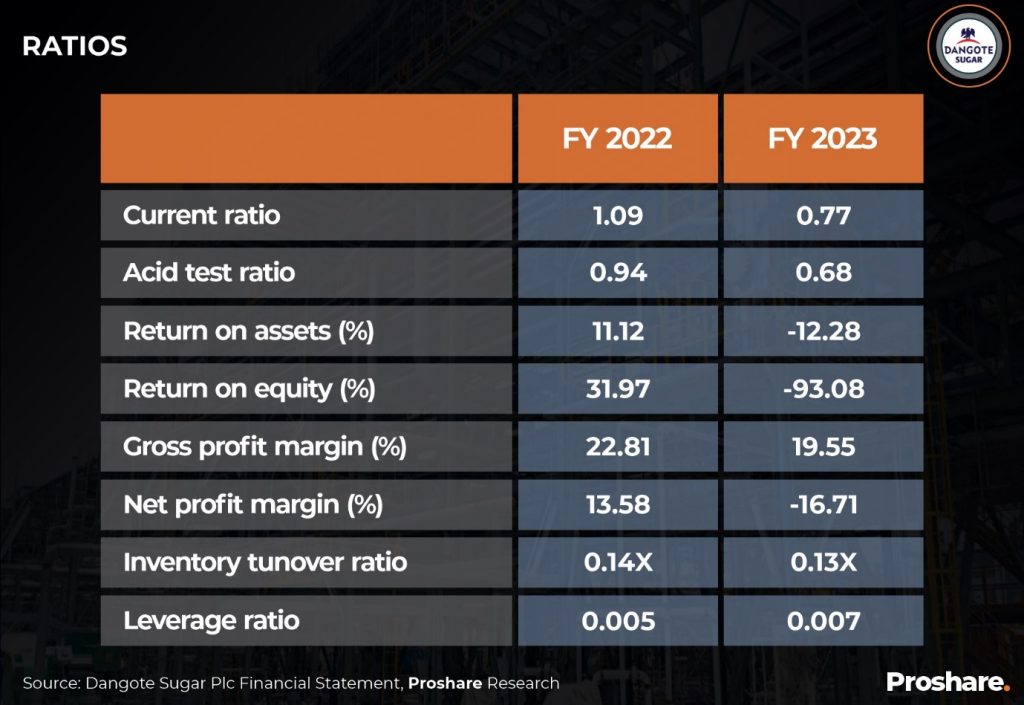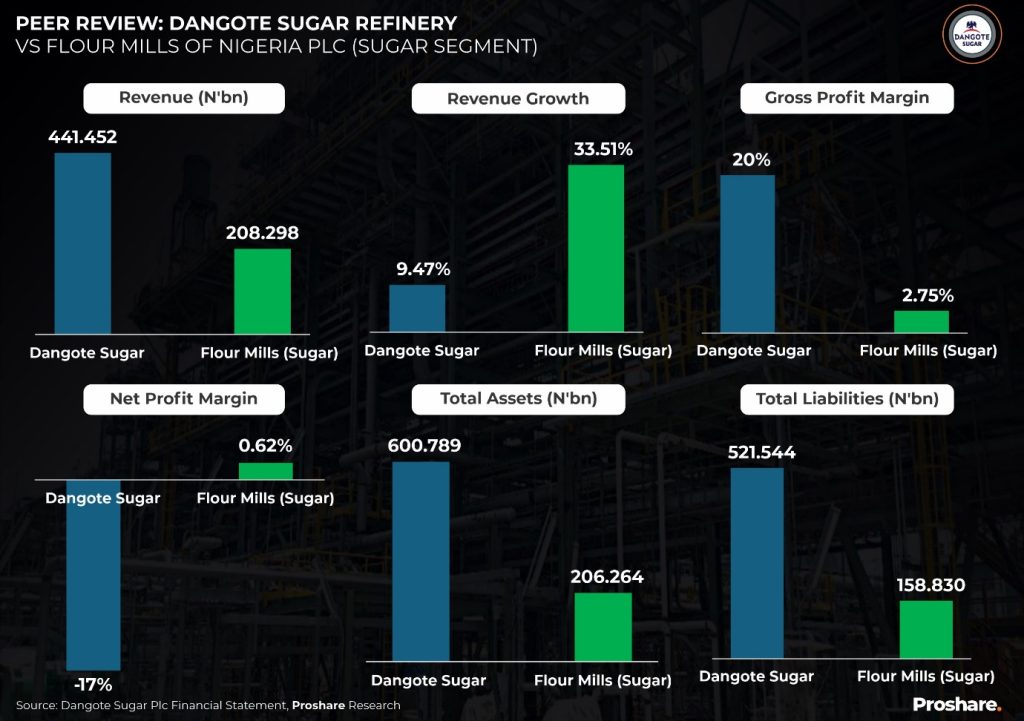
According to the United States Department of Agriculture, global sugar production increased to 183.46mmt (million metric tons) in 2023 from 175.31mmt in 2022 but remained below global sugar requirements. The increase was largely driven by Brazil and India’s production, which account for over 40% of the global sugar supply.
It was not surprising that concerns mounted in 2023 as sugar prices contributed to inflation following reduced supply from two of the largest sugar producers—India and Thailand—given unfavourable climate conditions and irregular rainfall, prompting increased prices.
For domestic sugar-producing giants like Dangote Refinery Plc (DSR), it may have seemed like a double-edged sword. Not only did supply to the global market become disrupted, resulting in surging prices of raw sugar imports, but also a battle with domestic macroeconomic challenges of FX instability, inflation, energy and infrastructural deficits, regulatory uncertainties, and insecurity.
Macroeconomic Landscape
The macroeconomic landscape in FY 2023 presented formidable business conditions, as indicated by various economic indicators (See illustration 1 below).
The challenging macroeconomic conditions impacted the operating conditions. Despite a commendable +9.47% growth in revenue to N441.45bn in FY 2023 from N403.25bn in a similar period in 2022, Ravindra Singhvi (DSR CEO) states that “…rising inflation, currency devaluation and strained consumer incomes…” saw net earnings reach (₦73.8bn) in FY 2023 from N54.742bn majorly driven by non-cash foreign exchange loss of ₦172.2bn in FY 2023.
The strategic importance and precarious dependence on sugar made it imperative for Nigeria to develop phase two of the Nigeria Sugar Master Plan (NSMP) that will ensure sufficiency in sugar production and even boost Nigeria to become a net exporter. The master plan is to span the period 2023-2033. Dangote sugar Refinery Plc has stated its commitment to sugar sufficiency in Nigeria.
“We are going to play our part in ensuring that Nigeria becomes self-sufficient in sugar within a very short period. We are not the only players, but we will surely play our part. – Aliko Dangote (Chairman)
“Our commitment remains steadfast, ensuring the delivery of high-quality products to our valued customers as we continue to work towards fulfilling Nigeria’s Sugar Master Plan, positioning Nigeria as a self-reliant player in the global sugar industry. – Ravindra Singhvi, (CEO),
Investor Indicators
- Market Capitalization N0.56trn
- Current Share Price N46/share
- P/E -9.39X
- P/B 0.72X
- P/S 0.13X
- EV/EBITDA 4.88
- EPS -6.07
- Div. Yield 3.26%
- Industry average Div. yield 6.40%
- Payout ratio 6.31
Key Financial Highlights
- Dangote Sugar Refinery Plc’s revenue rose by +9.47% to N441.45bn in FY 2023 from N403.25bn in a similar period in 2022, driven by the sale of sugar (50kg) and sugar (Retail), which grew by +9.07% and +45.36%, respectively.
- Cost of sales grew by +14.09% to N355.15bn in FY 2023 from N311.28bn in FY 2022.
- The company’s gross earnings stood at N91.96bn in FY 2023, increasing by +6.6% from N86.30bn in a corresponding period in 2022.
- The sugar company saw its pre-tax and post-tax profits decline for a second time in five years by -232.34% and -234.74% to (N108.92bn) and (N73.76bn) in FY 2023, respectively.
- Total assets grew by +22.0% to N600.79bn in FY 2023 from N492.43bn in FY 2022.
- Total borrowings declined by -31.4% to N0.53bn in FY 2023 from N0.77bn in FY 2022.
- Inventories rose by +8.25% to N47.92bn in FY 2023 from N44.26bn in FY 2022.
- Dangote Sugar Refinery Plc’s finance income increased to N10.56bn in FY 2023 from N6.38bn in FY 2022.
- Finance costs rose by +1957.4% to N201.67bn in FY 2023, driven by the soaring FX loss, which rose by +9015.78% to N172.19bn in FY 2023 from N1.89bn in FY 2022.
- Declining net earnings saw the sugar producers retained earnings fall by -57.9% to N66.88bn in FY 2023 from N158.85bn in FY 2022.
- The company’s Cash and cash equivalents improved by +17.1% to N204.76bn in FY 2023 from N174.86bn in FY 2022.
- Earnings per share fell to -N6.07k in FY 2023 from N4.51k in FY 2022.
Key Operating Highlights
- The Numan factory upgrade (in Adamawa state) to 9800 metric tons of sugar cane per day (TCD) is ongoing and will be completed by the end of 2024.
- Plan to generate an estimated 32 megawatts of electricity from the upgrade operations at the Numan factory by installing new turbines and 2 high-pressure boilers.
- The engineering design for the 12,000TCD sugar factory in Nasarawa has been completed, and the equipment supply contract has been signed.
Revenue
Dangote Sugar Refinery Plc has sustained its growth in the last five years, driven majorly by 50kg sugar sales and retail sugar sale activities. However, the revenue growth has not been as steady, growing by +9.47% in FY 2023 compared to the revenue growth of +46.07% obtained in FY 2022 (See chart 1 below).
Segmental Performance
All activities contributing to revenue recorded growth except freight income flows grew by -43.60% as income from goods shipped to various locations decreased in 2023. The sugar producer’s 50kg sales activity grew by +45.36% in FY 2023. The sale of sugar (50kg) and Sale of sugar (Retail) contributed about 96.60% and 2.60%, respectively, to Dangote’s revenue in FY 2023, while the sale of the sugar refining by-product, molasses, contributed 0.52% to revenue and grew by 6.52% in FY 2023 (See chart 2 below).
Profitability
Dangote Sugar’s PBT has stood positive in the past five years except in FY 2023, where pre-tax profits dipped by -232.34% to -N108.92bn from N82.30bn in a similar period in 2022. Post-tax profit margins, headed southwards at the end of FY 2023 to -16.71% from 13.58% in FY 2022. The negative returns were majorly attributable to net Finance cost of N191.10bn in FY 2023 from N3.42bn in the previous year as FX loss rose by+9015.78% to N172.19bn in FY 2023 from N1.89bn in FY 2022 (See chart 3 below).
Financial Position

The company’s assets rose by 22.0% in FY 2023 to N600bn from N492.43bn in FY 2022. Asset growth in FY 2023 is attributable to biological assets, trade and other receivables, and cash and cash equivalents growth by +108.4%, +22.7%, and +17.1%, respectively. The growth in liquidity poses a weakness to the company’s cash position if payments are not received in due time. The sugar producer’s Liability increased by +69.53%, driven by a +78.22% growth in trade payables. Both borrowings and shareholders’ equity capital declined by -31.4% and -53.7% in FY 2023 as negative returns saw retained earnings decline by -57.9% in FY 2023 to N66.88bn from N158.85bn in FY 2022 (See table 1 below).
Cash Flow
Dangote Sugar Refinery Plc’s cash position rose by +17.10% as cash and cash equivalents increased to N204.76bn in FY 2023 from N174.86bn, while Net cash from operating activities rose by +32.1% from N18.46bn in FY 2023 to N13.97bn in FY 2022. Cash generated from the sale of the companies’ products and services decreased by -42.2% as net cash from operating activities stood at N60.93bn from N105.42bn. Net cash received from investment activities declined by -54.2% to N8.96bn from N19.57bn (See table 2 below).
Ratios
The company’s current ratio and acid test ratio stood at 0.77 and 0.68 respectively in FY 2023 from 1.09 and 0.94 in FY 2022. The company displayed its ability to meet its short-term obligations. However, this position showed marginal brittleness as current and acid test ratios declined. The negative returns recorded in FY 2023 saw a negative return on equity (ROE) and a negative return on assets (ROA) while the gross profit margin stood at 20%; the negative net earnings for the period saw net profit margins decline to -17% in FY 2023 from 14% in a corresponding period in 2022. Fall in reliance on borrowings to finance operations saw leverage ratio stand at 0.007 in FY 2023 from 0.005 in FY 2022 (See table 3 below).
Table 3:

Dangote Sugar’s Share Price Movement
The variations in investors’ buying interest in the shares of Dangote Refinery Sugar Plc remained high. Demand activities saw the company’s share price maintain an upward trajectory in the first three quarters of 2023. However, as demand waned in the last quarter of 2023, the share price of the sugar producer has declined at a steady pace (See chart 4 below).
Chart 4:
Valuation

Dangote Sugar Refinery Plc’s fundamental valuation showed that the price-to-earnings ratio dipped to -9.39x in FY 2023 from 3.56x in FY 2022, given negative net earnings and earnings per share (EPS). The company’s EPS fell to -N6.07 in FY 2023 from N4.51 in a corresponding period in 2022. on the other hand, the growth in the sugar producer’s net book value saw the price-to-book value rise to 0.72x in FY 2023, higher than 0.09x in FY 2022 (See chart 5 below).
Chart 5:

Competitors Analysis:
The sugar industry players saw revenue growth, although the prevailing macroeconomic conditions resulted in persistently low gross profit margins. The net profit margins of the industry giants were affected by increased costs and foreign exchange losses recorded in FY 2023. Specifically, Dangote Sugar Refinery Plc reported higher revenue and gross profit margins, but its negative net earnings led to lower net profit margins relative to Flour Mills of Nigeria (Sugar Segment). Additionally, both firms saw an increase in their net book value (NBV) in FY 2023, driven by increased assets and liabilities (See chart 6 below).
Chart 6:
Closing Thoughts
The global sugar business has been in a tough rut since 2023. In different parts of the world the sugar business has jumped through hoops of difficulties. From the 2023 monsoon in India that disrupted the supply chains of the world’s second-largest sugar producer to the climate difficulties in Thailand, the world’s second-largest commodity exporter, the world was in flux.
Brazil, the world’s largest sugar producer and Nigeria’s principal source of imports, has been pivotal to the global sugar narrative. According to the International Sugar Organization (ISO), Brazil exported a record 31.38MMT (million metric tons) of sugar in 2023, up 15% year-on-year (Y-o-Y), including 27.04MMT of raw sugar and 4.34MMT of refined sugar, up 12% and 38% respectively.
Nigeria’s 2013 sugar master plan was meant to encourage domestic sugar production, and by 2021, it was believed that Nigeria would be self-sufficient in sugar production. Unfortunately, by 2024, Nigeria was still heavily dependent on imported sugar and may remain so for several years. The country produces less than 10% of its sugar needs domestically. The Nigeria sugar masterplan needs rethinking with the goal of improving the ratio of sugar import to domestic production. An annual target may be needed with government monitors aligning domestic output reviews with annual targets.
With fresh government policies towards the sugar industry and a commitment to self-sustainability, companies like Dangote Sugar Plc should do well in the medium to long term.




